With the arrival of the Mozilla Firefox 3.5 Beta I figured it was a good time to run some benchmarks on the major web browsers available for Windows. I chose to run the Acid3 Test and Google's V8 Benchmark. The Acid3 Test checks to see if a browser properly renders a page according to web standards. The V8 Benchmark is a test of JavaScript execution speed. I know there are more exhaustive benchmarks available, notably SunSpider and Peacekeeper. Both of those take quite a bit of time to execute and I didn't feel like it would add much value to the rating.
My test setup was my modest desktop computer running an AMD Athlon XP clocked at 2.0 GHz, with 1 GB of RAM, running Ubuntu 8.04. Tests were run on Windows XP SP3 with the latest patches running on Sun's VirtualBox with 192 MB of RAM made available to the virtual machine.
Scores for the Acid3 Test - Best to Worst
Safari 4 (Windows Public Beta) - 100
Firefox 3.5b4 - 92
Opera 9.6 - 85
Google Chrome 1.0.154.65 - 79
Internet Explorer 8 - 20
Internet Explorer 7 - DNF
Scores for the V8 Benchmark - Best to Worst
Google Chrome 1.0.154.65 - 1444
Safari 4 (Windows Public Beta) - 1058
Firefox 3.5b4 - 147
Opera 9.6 - 98.9
Internet Explorer 8 - 29.8
Internet Explorer 7 - 16.6
Based on these results, I'm giving the win to Safari 4 with Google Chrome coming in second. Both of these blew the doors off the competition in the speed department. Chrome leaves something to be desired when it comes to standards compliance though. It's also no surprise that Google's browser excels in the benchmark written by Google.
I think standards compliance is more important than speed. Slow and correct is better than fast and incorrect. Based on that, one could argue that Firefox 3.5b4 deserves second place. I'm hoping that the Firefox developers can work out the last few kinks to fully pass the Acid3 Test for the official 3.5 release.
It's also noteworthy that IE7 and IE8 both made a dismal showing in these tests. Perhaps this poor performance is by design. Based on these results, Microsoft could certainly make a case that including Internet Explorer with Windows is not an anti-competetive practice. It's certainly non-competetive, but I don't think it's anti-competetive.
For reference I'm providing screenshots of the results of each test.
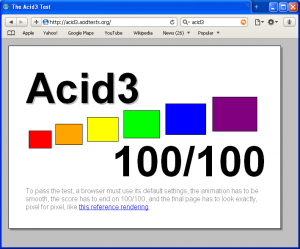
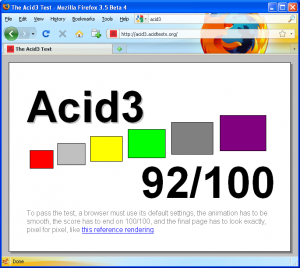
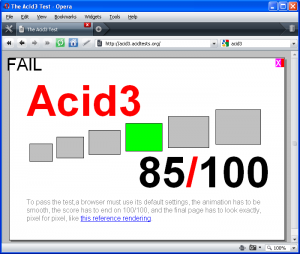
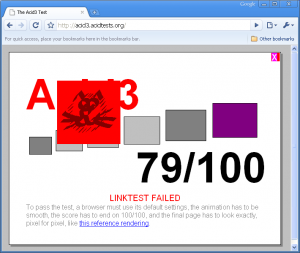
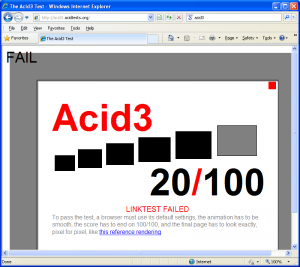


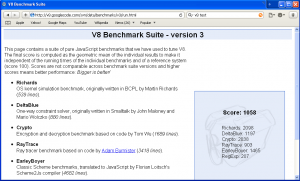
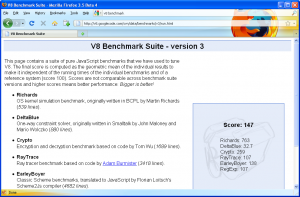
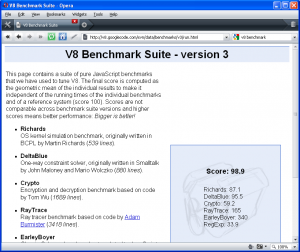
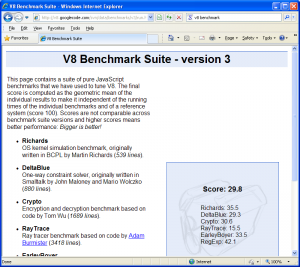
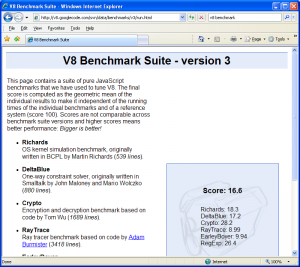
#
So speed and rendering are compared.
Should I have any concern with these browsers in terms of security?
Are there any other concerns for the casual web-surfer that might affect browser choice?
Thanks.
#
Both Safari and Firefox have a decent security reputation which may be unjustified. I believe the Mac with Safari was the first to fall in the most recent Pwn2Own contest and Firefox wasn't far behind. "Hi, I'm a Mac. I got hacked in under 10 seconds!"
The only browser to survive the hacking contest was Chrome. It sounds like Chrome's sandboxing technique is working.
All that being said, a chain is only as strong as it's weakest link. I think all of the browsers become vulnerable through insecure plugins like Flash. Thanks, Adobe!
#
Wow, I didn't realize how poorly I was being served until I read this post!
But, given the clever advertising, I am going to flush your recommendation and go ahead and click on the add to go to IE8.